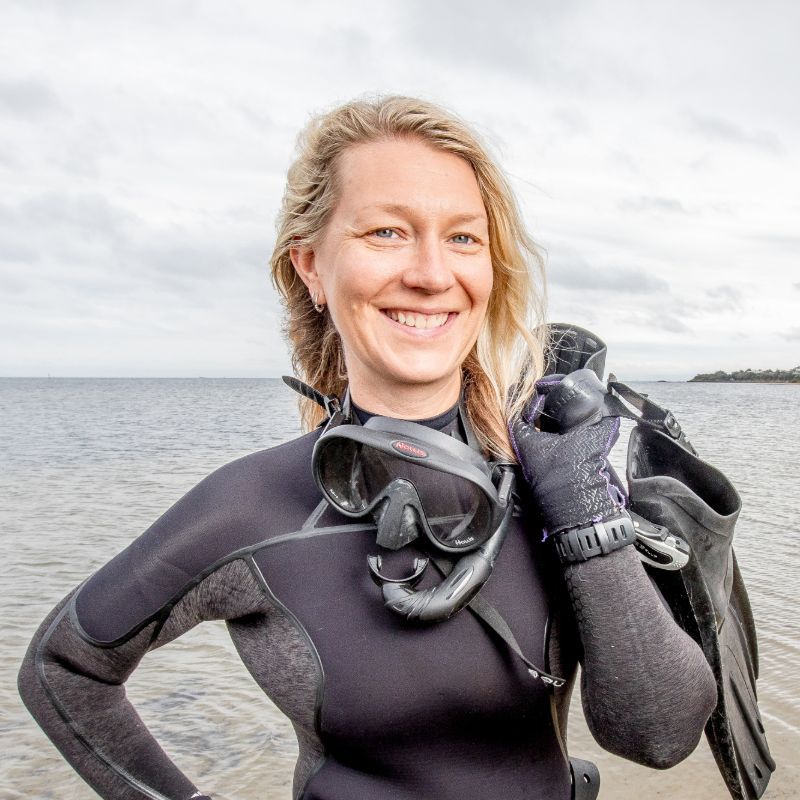Dr Pirjo Haikola
Lecturer in Design Innovation and Technology



Dr. Pirjo Haikola is a designer, researcher, certified diving instructor, sailor, and ocean advocate. Her research explores how design can contribute to environmental regeneration and conservation through more-than-human design approach and development of conservation technologies. Dr. Haikola specialises in biomaterials and natural materials for advanced and additive manufacturing. As an ‘underwater designer’ Dr. Haikola is passionate about contributing to ocean literacy through public engagement and teaching.
Dr. Haikola is a collaborator in the Reef Restoration and Adaptation Program (RRAP), Coral Aquaculture and Deployment sub-program. RRAP develops interventions to help the Great Barrier Reef resist, adapt to, and recover from the impacts of climate change. Within the Coral Aquaculture and Deployment sub-program, Dr. Haikola is developing materials and devices for scalable coral restoration efforts.
Dr. Haikola’s installations, ‘Urchin Corals’ in the NGV Triennial 2020, and ‘Urchin Corals and Process’ in Sampling the Future at NGV Australia Ian Potter Centre in 2021 offered a snapshot to her research and practice. The 3D printed corals were produced with materials combining biopolymers, sea urchin shells and natural materials. The installations also included underwater films, bringing to the surface problems from two different locations in Australia. Sampling the Future installation additionally opened up the process of underwater photogrammetry, material development and additive manufacturing to the public. ‘Urchin Corals’ was purchased by and is now part of the NGV collection. In 2019 Dr. Haikola, Prof. Julia Lohmann, Dr. Gillian Russell and Gero Grundmann curated the ‘Critical Tide’ exhibition for Helsinki Design Museum. ‘Critical Tide’ exhibition later travelled to the European Commission, Committee of the Regions in Brussels. The exhibition explored the agency of design and art in marine conservation.
Dr. Haikola’s work has been part of several exhibitions internationally and has been featured from national to international press, including Australian Financial Review, Wallpaper and the New York Times.

2016-2019 - Design Research Consultant for Suunto dive (FI)
2018 - Postdoctoral Researcher, Aalto University (FI)
2007-2018 - Sessional Lecturer (annual courses), School of Arts, Design and Architecture, Aalto University, Helsinki (FI)
2014 – 2016 - Assistant Professor, IADE, Creative University, Lisbon (PT)
2007-2010 - Lecturer and researcher, The Why Factory, Faculty of Architecture, Delft University of Technology (NL)

Dr. Pirjo Haikola's research explores how design can contribute to environmental regeneration and conservation through more-than-human approach and development of conservation technologies. Dr. Haikola specialises in biomaterials and natural materials for advanced and additive manufacturing.
Marine conservation technologies, More-than-human design, Nonhuman design, Regenerative design, Environmental design, Advanced manufacturing, Additive manufacturing
Publications
Awards

Sampling the Future, the National Gallery of Victoria, Ian Potter Centre, Melbourne (AU)
Oct 2021 - Feb 2022
2020 Triennial, the National Gallery of Victoria, Melbourne (AU)
Dec 2020 - Apr 2021
Jacques Delors building, the European Economic and Social Committee, Brussels (BE)
Curators, Julia Lohmann, Pirjo Haikola, Gillian Russell and Gero Grundmann.
Nov - Dec 2019

Collaborator
2020


Acknowledgement of Country
RMIT University acknowledges the people of the Woi wurrung and Boon wurrung language groups of the eastern Kulin Nation on whose unceded lands we conduct the business of the University. RMIT University respectfully acknowledges their Ancestors and Elders, past and present. RMIT also acknowledges the Traditional Custodians and their Ancestors of the lands and waters across Australia where we conduct our business - Artwork 'Sentient' by Hollie Johnson, Gunaikurnai and Monero Ngarigo.
Acknowledgement of Country
RMIT University acknowledges the people of the Woi wurrung and Boon wurrung language groups of the eastern Kulin Nation on whose unceded lands we conduct the business of the University. RMIT University respectfully acknowledges their Ancestors and Elders, past and present. RMIT also acknowledges the Traditional Custodians and their Ancestors of the lands and waters across Australia where we conduct our business.